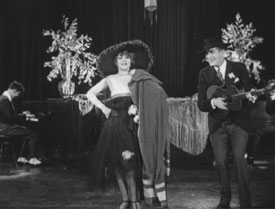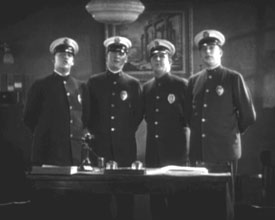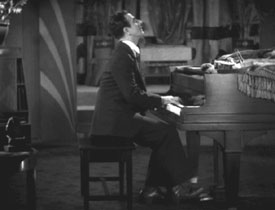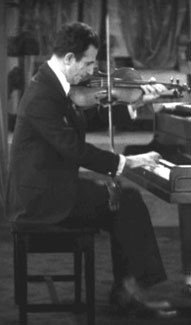 Blossom Seeley & Benny Fields with the Music Boxes (1929) features besides Seeley & Fields the rather collegiate-looking piano players Charles Bourne & Phil Ellis, with their pianos facing one another. They are the so-called Music Boxes, in the only film that bills them thus.
Blossom Seeley & Benny Fields with the Music Boxes (1929) features besides Seeley & Fields the rather collegiate-looking piano players Charles Bourne & Phil Ellis, with their pianos facing one another. They are the so-called Music Boxes, in the only film that bills them thus.
Out run Seeley & Fields to the center front of the stage. Blossom Seeley "the queen of syncopation" sings a wonderful jazz tune with husband Benny Fields harmonizing. The number is "Hello Mister Bluebird," a kind of reply to "Bye Bye Blackbird."
Blossom is cute as a button. Benny is something of an also-ran but entertaining. They comedy-talk their way into the next tune, when Blossom decides she wants to sing about Dixie. They make Irving Berlin's "The Call of the South" sound a lot like their first number.
Their third number has Blossom in sombrero & serape, & Benny with guitar for "A Little Spanish Town on a Night Like This," which once again they make sound pretty much the same as the first two numbers.
The song goes "Do you remember that town/ Do you remember that kiss/ A pretty little Spanish town/ On a night like this," with a few "dee dah doo-doo dee dah-dahs" tossed in.
As a first impression of an act not seen in any other context but this Vitaphone Variety short, Seeley & Fields seem a pretty good team. They don't seem likely to have been extremely famous in their day as they're not that good, but fact is, they were fairly major vaudeville headliners. Their lives were fictionalized in the film Somebody Loves Me (1952) with Betty Hutton as Blossom & Ralph Meeker as Benny.
Benny & Blossom remained married until his death in 1959. The last hurrah for his career was his starring role as Dixie Boy George in the enjoyable no-budget musical The Minstrel Man (1944), momentarily reviving a career that had been moribund for a decade.
Blossom would make her last public appearance on the Ed Sullivan Show in 1966 at age seventy-five. But the heyday for her & her husband was through the 1920s & their stardom was moderate to low for the rest of their decades as entertainers.
 We're on a set arranged to look like the police station, with four cops in dress uniforms. These guys are The Police Quartette (1927). Surprisingly enough they're actual L.A. police officers who did charity events, not a vaudeville act. We're on a set arranged to look like the police station, with four cops in dress uniforms. These guys are The Police Quartette (1927). Surprisingly enough they're actual L.A. police officers who did charity events, not a vaudeville act.
The phone rings & it's a request for the quartette to do their barber shop act for orphans. They're always eager to do that sort of thing, & begin practicing at once.
They harmonize wretchedly on the ultra-silly novelty song "Skinna-Ma Rink-A-Dink," & this turns out to be a rinky-dink act all righty. The song's so ridiculous, however, that it's undeniably fun: "I love yoodly doodly doodly do/ Skinna-ma rinking dink skiddling rinking do."
I've no idea if it's supposed to mean anything, but a much more recent generation who remember Sharon, Lois & Bram's Elephant Show in Canada may be startled that the song is so much older than that kiddie program.
They next take turns singing nursery rhymes, until they've all four sung a different rhyme in bizarre harmony. The alto voice sings "Little Jack Horner," tenor gets to do "Sing a Song of Sixpence," baritone does "Little Bo Peep" & bass does "Peas Porridge Hot." It's clever enough but it sounds awful; still, the orphans would likely like it.
Next they sing: "If I ever get the guy who stole the chicken from my back yard/ I ever get the guy who stole chicken, I'll treat him mighty hard." That silly novelty is called "Cluckin." Too bad they couldn't've done barnyard animals, as these cops could've been Oinkin.
Since the songs they've chosen aren't to be taken seriously, they don't need to be done well to be amusing. But when they attempt a serious romantic tune, "You Tell Me Your Dream," it's the weakeste of all: "I had dream; you had one too/ Mine was the best cuz it was about you..."
They wisely return to novelty number for their close: "It's the Washington Waddle/ Get the tune in your noddle/ Let your feet have fun/ Come on & waddle with me, waddle with me..."
This dance tune combines ragtime style with barbershop "Like a ragtime ship on a ragtime sea, waddle waddle waddle," & is rather jolly. Overall their performance sucked, but I smiled here & there, & hey, they did charities.
 Sol Violinsky, The Eccentric Entertainer (1929) begins with Sol Violinsky (stage name of Sol Ginsberg) at a Baldwin piano playing a circusy bit of ragtime, as yet revealing neither charisma nor eccentricity.
Sol Violinsky, The Eccentric Entertainer (1929) begins with Sol Violinsky (stage name of Sol Ginsberg) at a Baldwin piano playing a circusy bit of ragtime, as yet revealing neither charisma nor eccentricity.
He manages about half of a smile when the Vitaphone Orchestra joins in the tune from off-screen. Most of this short film, he will not have the orchestral accompaniment.
He stops playing a moment & says he's going to give an impression of "a piano player playing in an old-time picture theater" It's odd to think that in 1929 there was already a distinction between modern & "old time" cinema houses.
Sol procedes to play some standard silent film piano riffs for action, romance, marriage, patriotism, & so on. There's nothing at all remarkable about it.
In his heavy accent he announces, "My next little diddy, my own version of singing The Parade of the Wooden Soldiers." He then sings, rather badly, to his own accompaniment:
"In the pale moonlight when the moon shines bright/ You can see the darkies singing night & day/ And the banjos thrum & the darkies hum, my oh my."
This guy is such a dumbass, & continues to sing about "pickaninnies" picking cotton, "alabammy mammy," "giddyap Sambo" jockeys, with no more social awareness than your average creepy uncle insisting on entertaining the family during Hanuka.
He then tells what may be the worst vaudeville joke of all time, before introducing the part of his act which defines his "eccentric" nature, playing the piano & a violin at the same time.
He straps a bow to his knee so as to play the violin with one hand only, & the piano with the other. It is of course an awful piece of music, not the least bit clever, & not even funny enough to pass as comedy.
Sol, a Ukranian Jew who emigrated to America in 1901, wrote some popular novelty hits with sundry lyricists since his mastery of English was not so hot. Though you can't tell from his act, he was a good enough musician to be part of the New York Symphony Orchestra. His most lasting claim to fame is having co-written with Chico Marx what was something of Chico's signature song "I'm Daffy Over You."
Continue to:
Some Pathatone shorts & Soundies
copyright © by Paghat the Ratgirl
|



